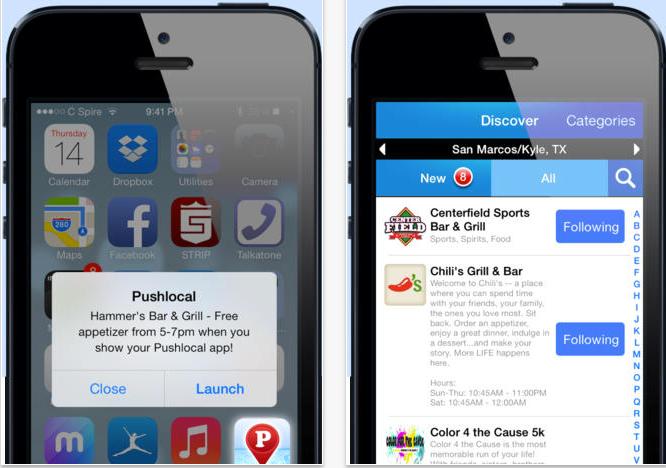Editor’s Note: This article was originally published by Web Marketing Today. Practical Ecommerce acquired Web Marketing Today in 2012. In 2016, we merged the two sites, leaving Practical Ecommerce as the successor.
As Internet users become increasingly mobile-savvy, they rely on smartphones and other mobile devices to discover new businesses, find directions, read consumer reviews, and access business contact information.
One way local small businesses can take advantage of this trend is through the use of location-based marketing.
What Is Location-based Marketing?
Location-based marketing uses a mobile device’s geolocation to alert the user about an offer from a business close by.
Location-based marketing typically comes in one of four forms.
- SMS text messaging. Location-based alerts deliver SMS text messages to smartphones. An alert might include a purchase incentive, such as a discount coupon code or daily deal.
- Check-ins. Visitors use a mobile app’s “check-in” feature to notify social network friends and followers when they are inside a business location. Yelp, Facebook, and Foursquare’s Swarm app offer check-in capabilities.
- Push notifications. The app sends push notifications to users who have opted-in to receive special offers, notices about events, and other information regarding the business.
- Pull notifications. Using apps that enable pull notifications, people in the vicinity of a business are alerted to special offers, deals, or events. For example, a restaurant can use pull technology to notify a person who is walking by that they have a special offer on an individual menu item. Pull notifications take advantage of “geo-fencing” technology, which triggers an alert on the user’s device when it crosses a pre-defined geographic boundary.

Pushlocal sends push notifications to opt-in subscribers.
Location-based Marketing Benefits
Location-based marketing offers benefits to consumers and businesses alike. Consumers may appreciate the following.
- Permission-based. In the case of SMS and push notification, users opt-in, giving the business permission to send messages.
- Convenient. Most people are never without their mobile phone. Having an app that incorporates location-based technology adds a layer of convenience at times when the person has purchase intent.
Location-based marketing benefits businesses in the following ways.
- Comparatively low cost. Compared to other forms of advertising, location-based marketing can be less expensive. For instance, Pushlocal, a push notification app, charges local small businesses as little as $50 per month.
- Focus on geographic targeting. Businesses only target people who are within their immediate geographic area.
- Gain customer insights. User reviews on sites like Yelp or Foursquare let companies know what customers are thinking — insights they can use to improve the quality of their products or services.
- Enhance customer loyalty. Check-ins give businesses a tangible way to identify their most loyal customers and reward them with incentives and recognition.
- Attract new customers. Offering real-time incentives when a prospective customer is nearby can be a way to build brand awareness and increase foot traffic.
- Convert impulse purchases. Using pull notifications, persons who are within physical proximity to a business may be enticed to come inside and make a purchase.
- Improve search engine ranking. Sites like Yelp and Facebook tend to rank well in search engines, which is another reason to list a business.
- Measure customer data. Many location-based services provide data on check-ins and other metrics, which enables a business to measure the results of its marketing efforts.
Location-based Marketing Apps
There are a number of LBM apps. Here are three notable ones.
- Facebook. Through its Facebook Places Nearby, Local Awareness Ads, and check-in features, Facebook offers plenty of opportunities for local businesses to market themselves to mobile users.
- Yelp. The mobile version of review site Yelp includes a check-in feature. It is also one of the most commonly-used sites for collecting consumer ratings and reviews.
- Foursquare. Foursquare recently split-off its check-in feature to a new app called Swarm and now focuses its attention on consumer reviews and recommendations, similar to Yelp.
Ways to Utilize Location-based Marketing
Here are eight ways to utilize location-based marketing opportunities.
- List your business location on major location-based marketing services such as Foursquare, Yelp, and Facebook.
- Include your company listing in local directories such as Google My Business and Citysearch.
- Incentivize consumers to do business with you by using a loyalty rewards program, special offers, and exclusive deals.
- Ask customers to check-in and share their location with social network friends and followers. (To use Facebook’s check-in feature, you must have a business page and choose the “local business” category.)
- Offer helpful tips that are relevant to your industry and city. This is a way to foster loyalty among consumers within the local community.
- Shine the spotlight on your most loyal customers with social network shout-outs and rewards.
- Train your staff to remind customers to check-in and share their location with friends and followers on social networks.


